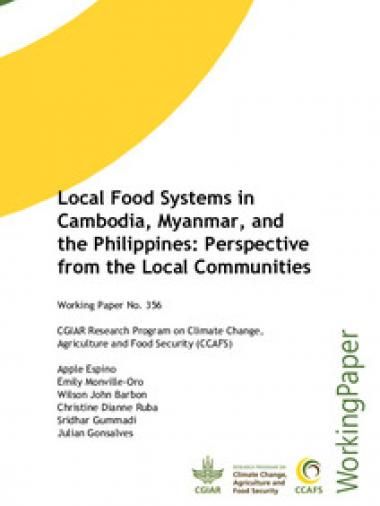Local Food Systems in Cambodia, Myanmar, and the Philippines: Perspective from the Local Communities

Food systems must provide adequate, healthy, and sustainable diets to the growing and changing population whilst responding to shocks and stressors related to climate variability, urbanization, globalization, conflicts, and economic change. This study examined the national food systems of Cambodia, Myanmar, and the Philippines and the local food systems of complementary Climate-Smart Villages: Chhouk, Htee Pu, and Himbubulo Weste.
Among several food system drivers, climate change is the external stressor perceived strongly in agricultural communities and as shown by the data on national climate variability. Income and gender inequality, political instability, and socioeconomic circumstances undermine multi-level interventions to deliver necessary food system outcomes.
While national policies to achieve an equitable and resilient food system are critical, local-level initiatives such as implementing climate-smart agriculture strategies, recognizing landlessness issues, and addressing fragmented market infrastructure are vital for the local food systems to thrive and deliver on health, economic and environmental goals. This could also guide in establishing standards, collective goals, and policy formulation directions for robust national food systems.
Citation
Espino A, Monville-Oro E, Barbon WJ, Ruba CD, Gummadi S, Gonsalves J. 2021. Local food systems in Cambodia, Myanmar and the Philippines: Perspective from the local communities. CCAFS Working Paper no. 356. Wageningen, the Netherlands: CGIAR Research Program on Climate Change, Agriculture and Food Security (CCAFS).